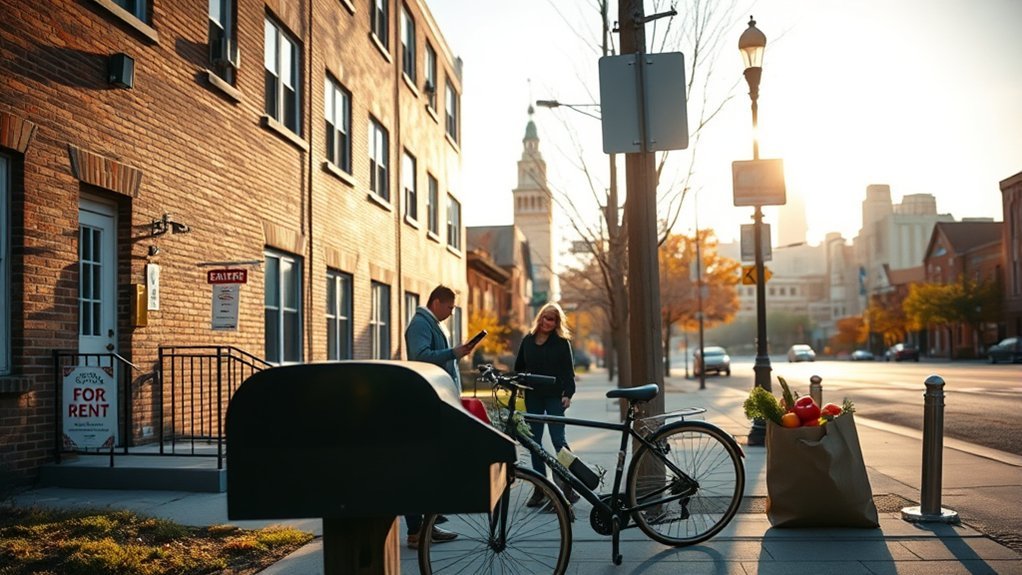If you’re planning a move to Lincoln or just reworking your monthly budget, you’ll want clear numbers on rent, utilities, groceries and transport so you can plan with confidence. Rents typically run around $1,000–$1,300, utilities vary by household type, and overall costs sit a few percent below the national average — but housing and commuting choices can shift your monthly needs markedly, so keep going for a concise breakdown.
Cost of Living Snapshot for Lincoln, NE

Although Lincoln’s overall cost of living sits about 5.5% below the U.S. average, you’ll find specific expenses vary: renters typically pay 8.9% less while homeowners see roughly a 5.8% lower cost.
Although Lincoln’s overall cost of living is about 5.5% below the U.S. average, renters save more than homeowners.
You’ll want a data-driven snapshot to plan: average rent for typical apartments ranges roughly $1,023–$1,277/month (median house rent about $1,299), and single-adult annual housing costs are estimated near $19,800.
Monthly utilities run about $175–$182 for energy, with phone service near $203 and overall utilities about 7% below national norms.
Grocery prices track the national average — milk, eggs, ground beef near typical U.S. levels — while healthcare visits skew higher.
Median household income and local wages affect affordability; a recommended pre-tax salary to live comfortably as a single adult is about $52,068/year.
Use these figures to balance budget lines: rent, monthly utilities, groceries, healthcare, and taxes when estimating your realistic monthly needs. Additionally, understanding the average cost to build a house can provide valuable context for long-term financial planning.
Housing: Rent and Home Prices

You’ll find average rents in Lincoln typically range from about $850 for studios up to $1,200+ for one- and two-bedroom units, with three-bedrooms or family homes closer to $1,700/month.
Typical home prices reported by sources span roughly $263,400 to $395,000 (state median nearer $228,100), and year-over-year rent growth has been positive while local rents remain about 35% below the national average.
We’ll compare these figures to owning costs — down payments, mortgage estimates, and neighborhood price variation — so you can weigh renting versus buying. Additionally, retainers and their replacement costs can also impact your monthly budget if dental care is needed.
Average Rent Levels
When you’re budgeting for housing in Lincoln, expect monthly rents to vary from roughly $850 for studios up to $1,200–$1,300 for common one- and two-bedroom units, with broad averages reported around $1,023 (Apartments.com) and $1,277 (Zumper). You’ll find average rent in Lincoln depends on unit type and area: one-bedroom two-bedroom rents range roughly $930–$1,239 and $1,115–$1,224 across sources. Median rent for house listings is about $1,299/month. Neighborhood rent differences matter — Bishop Park and Irvingdale trend near $900, while 68506 and 68516 run higher. Use this quick table to compare typical monthly rent tiers and scope when searching for affordable neighborhoods or budget planning.
| Unit Type | Typical Range | Notes |
|---|---|---|
| Studio | $850 | Lower-cost option |
| 1‑BR | $930–$1,239 | Varies by source |
| 2‑BR | $1,115–$1,224 | Suburbs higher |
| Houses (median) | $1,299 | Wide listing spread |
Home Price Snapshot
Start by putting Lincoln’s housing numbers side-by-side so you can see tradeoffs: median home prices cluster near $390,800 (with some datasets reporting city medians as low as about $263,400), while monthly rents for apartments typically run between roughly $1,023 and $1,339 depending on unit size—studios near $850–$1,021, one‑bedrooms about $966–$1,239, and two‑bedrooms around $1,115–$1,224; house rentals show a median near $1,299 but range widely.
You’ll find Lincoln’s real estate market offers lower overall housing costs than national averages, so buying or renting can be an affordable option.
Consider projected mortgage payments, local taxes, and maintenance when comparing the median home price to monthly rent and other cost around numbers.
- Median home price context and range
- Typical monthly rent breakdown
- Mortgage payments vs. rent snapshot
- When buying becomes an affordable option
Renting vs. Owning
Having lined up Lincoln’s sale and rental figures, let’s compare what renting versus owning will actually cost you month to month.
If you rent, average apartment rent runs about $1,023–$1,277 depending on unit; studios average $850–$1,021, one-bedrooms $966–$1,239, and two-bedrooms near $1,224. Median rent for houses is roughly $1,299, with some neighborhoods like Bishop Park and Irvingdale closer to $906.
If you buy, median home price ranges roughly $263,400–$390,814; with current mortgage rates near 7.10% your monthly housing cost rises once taxes, insurance and maintenance are included.
Use the local cost of living index — ~5.5%–5.8% below national — to model savings.
Weigh flexibility and upfront costs when deciding renting vs owning.
Monthly Utilities and Telecom Costs

Typically, you’ll pay around $353/month in utilities as a renter and about $781/month as a homeowner in Lincoln. You should budget monthly utilities into rent or mortgage calculations because energy costs and telecom add up: energy averages about $182/month (≈14% below U.S. average) while phone service runs about $203/month, slightly above the national norm. Homeowners face higher bills due to larger spaces and extra services.
- Expect utilities to include electricity, water, sewer, trash, and internet.
- Plan for phone service near $200/month unless you pick a cheaper plan.
- Energy costs are lower than the U.S. average, saving you roughly $28/month.
- Remember that some fees (internet, sewer, trash) may be billed separately.
- Additionally, plan for operational expenses like maintenance and supplies when budgeting for living costs.
Use these figures to model realistic monthly utilities for renters vs. homeowners, adjusting for household size and consumption patterns to avoid surprises.
Grocery and Food Expenses

While grocery prices in Lincoln track very close to the national norm, your weekly and monthly food bills will hinge more on household size and diet than regional markups. Groceries in Lincoln are about 1.0% below U.S. average; bread and milk prices sit near parity (whole milk about $4.67 per half gallon, loaf of bread ~$3.80). Use household type to plan monthly grocery spending: renters, homeowners, couples with kids, or a single adult will see large variance.
| Item | Typical price/estimate |
|---|---|
| Whole milk (½ gal) | $4.67 |
| Loaf of bread | $3.80 |
| Ground beef (per lb) | $6.98–$7.36 |
| Monthly (renter) | $685 |
| Monthly (homeowner) | $1,361 |
If you’re a single adult, conservative grocery budgets run $500–$800/month; some sources list higher blended figures (~$4,228/month) that include dining out and broader food costs. Focus on household size and diet when estimating average cost of groceries in Lincoln. Regular preventative maintenance can also help in managing overall household expenses, including food budgets.
Healthcare Costs and Typical Visits

Although healthcare in Lincoln can feel costlier than in many parts of the U.S., you’ll find specific services are fairly predictable: a primary care visit runs about $183–$187 (roughly $184), which is nearly 27% above the national average, routine dental cleanings are about $110–$113, and optometry visits fall in the $119–$128 range.
You’ll pay roughly $11 for common over-the-counter medication like ibuprofen, and annual benchmarks show doctor visits and specialist care push Lincoln’s healthcare index about 4–5% above the U.S. average.
Monthly healthcare spending varies: single renters average about $148–$150, while homeowners average near $422, reflecting broader utilization and insurance differences.
- Expect primary care and specialist doctor visits to be the largest out-of-pocket items.
- Budget routine dentist visits at roughly $110–$113 per visit.
- Plan for an optometrist check-up in the $119–$128 range.
- Include $10–$15 per month for over-the-counter medication in your budget.
Transportation and Commuting Expenses

You’ll find gas in Lincoln runs about $3.15 per gallon, roughly 2% below the U.S. average, which helps keep driving costs modest.
Expect to budget for maintenance — routine services like a tire rotation cost about $64–$66 and small repairs average near $111 — and typical monthly transportation spending is around $385 for renters and $813 for homeowners.
Public transit is limited but cheap (monthly passes are roughly in the $17 range), so most residents still rely on cars, leaving overall transportation costs about 0.8% below the national average. Additionally, regular inspections can help prevent costly issues like air conditioning performance that could arise from neglecting vehicle maintenance.
Gas and Fuel Costs
Gas prices in Lincoln sit near $3.15 per gallon — about 2–3% below the national average — so you’ll pay slightly less at the pump than most Americans. That difference helps keep transportation costs modest: typical monthly commuting runs around $385 for renters and $813 for homeowners, with gasoline in Lincoln a regular line item. Public transit can cut costs if routes match your commute, but limited coverage means many still rely on cars.
- Expect gas prices compared to national to be marginally lower, easing weekly fill-ups.
- Factor gasoline into your monthly commuting budget rather than just per-trip math.
- Combine driving with occasional public transit to reduce total transportation costs.
- Monitor fuel prices and plan errands to limit unnecessary mileage.
Vehicle Maintenance Expenses
Factor routine upkeep into your monthly budget: typical maintenance events run $50–$150 (with tire rotations around $64–$66 and common repairs averaging about $111), and those costs add to fuel, insurance, and registration to produce average transportation expenses of roughly $385/month for renters and $813/month for homeowners in Lincoln. You’ll track gasoline at about $3.15/gal, slightly below the U.S. norm, but your monthly fuel bill depends on commute distance. Plan for regular vehicle maintenance and occasional car repairs so unexpected costs don’t spike your monthly transportation spending. Below is a simple breakdown to guide budgeting.
| Item | Typical cost | Frequency |
|---|---|---|
| Tire rotation | $64–$66 | Every 6k–8k mi |
| Common repair | ~$111 | As needed |
| Insurance/registration | Varies | Monthly/annual |
Public Transit Options
If you want to cut commuting costs, Lincoln’s modest public transit can make a real difference: a monthly bus pass runs about $17 (versus roughly $55 in Omaha), and frequent routes serve downtown, the university, and central neighborhoods.
You’ll see clear savings from transit compared with driving—less spent on gas (around $3.15/gal), parking, and maintenance—so factor the monthly bus pass into your transportation budget.
Public transit is best if your commute stays within core areas; limited route coverage means you might still need a car or rideshare for first/last-mile legs. Compare route maps and costs before switching.
- Affordable monthly bus pass lowers commuting costs immediately
- Frequent routes cover downtown and UNL
- Limited route coverage affects peripheral commutes
- Weigh savings from transit vs. car expenses
Goods, Services, Entertainment and Personal Care

Expect goods, services, entertainment and personal care in Lincoln to run a bit above national norms—about 4.1% higher overall—so plan budgets accordingly. You’ll see goods & services show up in rent-adjacent bills: renters average ~$1,118/month, homeowners ~$2,774/month. Service prices push discretionary spend — dry cleaning ~$19.85, movie tickets $13.68–$14.19, haircuts $32.53–$44.72. Personal care and lifestyle items (gym, yoga ~$19.93, lattes ~$5.66) nudges the miscellaneous index up. Additionally, budgeting for emergency preparedness can help mitigate unexpected expenses, such as those arising from vehicle breakdowns.
| Category | Typical Cost | National Delta |
|---|---|---|
| Renters’ goods & services | $1,118/mo | +4.1% |
| Homeowners’ goods & services | $2,774/mo | +4.1% |
| Dry cleaning | $19.85 | +15% |
| Movie ticket | $13.68–$14.19 | +10% |
For monthly per-person planning, treat entertainment and personal care as notable line items—often higher than groceries or gas—so prioritize them in your discretionary spend.
How Much Salary You Need to Live Comfortably

Having looked at how goods, services and personal spending push your monthly bills above national norms, you’ll want to know what salary covers those costs in Lincoln. You should target a cost of living–aware pay level: for a single adult that’s about $52,068/year before taxes (roughly $4,339/month) to cover basic expenses and utilities cost.
If you follow the 30% rule for housing, the average rent suggests a gross monthly income closer to $5,500–$6,000 to avoid overspending. For couples with kids, plan on an annual salary requirement near $86,388 combined to meet $7,199/month in expenses.
- Single adult benchmark: $52,068/year (~$4,339/month)
- Housing-focused target: $5,500–$6,000/month gross for average rent
- Family benchmark: $86,388/year combined for basic expenses
- Budget components: housing ~$19,800/year, groceries, utilities cost, other essentials
Additionally, consider how long-term savings from investing in personal fitness can positively impact your overall financial health.
Use these figures to set your monthly income needed and adjust for personal lifestyle.
Frequently Asked Questions
How Much Do You NEed to Live Comfortably in Lincoln, NE?
You’ll need about $52,000 a year pre-tax (roughly $4,339/month) to live comfortably in Lincoln; that covers rent (~$1,000–$1,300), groceries, utilities, healthcare, transportation, and modest savings.
What Is the Average Cost of Living in Lincoln Nebraska?
The average cost of living in Lincoln is about 5.5% below the U.S. average; you’ll likely need roughly $52,000 pre-tax annually, with typical rent around $1,000–1,339/month and utilities, groceries, healthcare adding regular expenses.
How Much Does It Cost to Live in Lincoln?
You’ll need roughly $4,300 monthly as a renter or about $7,950 as a homeowner to live comfortably in Lincoln; typical one‑bed rent runs $930–$1,339, with groceries near national levels and utilities below average.
How Much Does Independent Living Cost in Lincoln, NE?
Think of Lincoln as a steady sail: you’ll need about $4,339 monthly (roughly $52,068/year) to live independently, covering rent, utilities, groceries, transport, healthcare, and modest extras while keeping housing near 30% of income.
Conclusion
So you’ll survive Lincoln: rent’s reasonable, utilities sane, groceries predictable — and you’ll still envy anyone who owns a home. Budget about $5,500–$6,000 gross if you want comfort; otherwise enjoy creative ramen cuisine. Taxes won’t bite harder than the national average, but housing will flirt with your paycheck. Be practical: track expenses, prioritize housing, and laugh at inflation the way a Midwesterner laughs at snow — resigned, mildly amused, and already shoveling.


